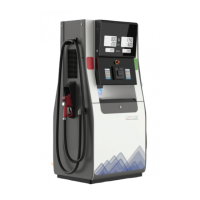Completing Installation Purging Air from System and Testing
Page 8-4 MDE-5427E Latitude
™
Installation Manual · July 2022
Purging Air from System and Testing
For New Dispensers (Purging Through Shear Valve)
Before purging, some programming is required for new Latitude dispensers.
Latitude Units
The Latitude units are received precalibrated but must be checked for calibration before use.
Purging requires the unit to be configured for gallons, liters, or imperial gallons.
When purging Latitude units, if you exceed more than 250 volume units for any meter on a side,
the startup technician will not be able to reset the volume totals to zero or any other value for
opening the station. Avoid purging of more than 200 units of volume per meter as a result.
Purging, calibration, and calibration verification can be performed within this limit and totals
reset, if required.
IMPORTANT INFORMATION
Programming Units of Measure
For Latitude units, this procedure is referred to as setting the Conversion Factor.
Special Steps to Purge Air from Underground Lines
For sites with underground lines not filled with fuel, air must be purged from the lines before
purging the dispenser.
Do not attempt to purge these lines using the dispenser nozzle as the dispenser
meters may suffer damage due to overspeed.
CAUTION
To prepare for purging, use the following steps for each shear valve in all units. Be observant
during purging and check for plumbing leaks as you move toward the tank. For blender
nozzles, select a blend grade. Ensure that the prices are set (by the ASC) before you begin.
1 Turn off all power to the STPs involved.
2 Start with the unit farthest from the tank.
3 Use a sealant to connect a “gasoline suitable, conductive hose” to the shear valve test port.
4 Install the mechanical valve (petcock) to the hose.
5 Place the drain end of the closed valve in an approved metallic container. Clean up any spills
promptly.
6 Turn on power to STPs. Activate the STP for the line being purged.
7 Slowly open the mechanical valve until you obtain a slow, constant stream of fuel flow.
Maintain contact between the metallic valve and the can during fuel flow.

